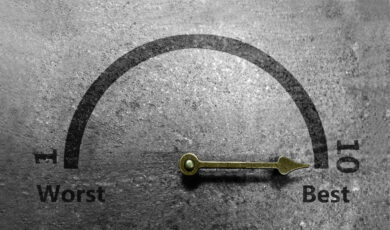The Benefits of Using MaxDiff as a Research Method

Article by Patrick Fiorenza, RMS Director of Research Analytics –
MaxDiff (Maximum Difference Scaling) is a common analysis technique which helps companies distinguish between consumers of the “best” and “worst” options. In survey research, participants are typically provided a list of choices and asked to select the best and worst options, or most/least likely items to purchase. This information has many benefits including helping organizations improve marketing campaigns, go-to market strategies, and product development. MaxDiff is like Conjoint Analysis in that it helps clarify preferences but differs in that it forces individuals to make tradeoffs and identify their preferences for items or services.
For example, let’s say that a credit union is looking to improve member satisfaction. They know there are various areas that are important, such as:
- Mobile banking
- Loyalty rewards
- Cybersecurity protections
- ATM access
- 24/7 Support
- Overdraft protections
- Cash-back purchases
One way to ask this question would be to request participants to rank each item on a scale from 1 to 5, with one “not important” and 5 “very important.” There is nothing wrong with this approach and it may reveal some interesting insights. However, using a MaxDiff method will yield better data and, more precisely, get to the question at hand: which type of member engagement strategy should we employ?
Rather than using a Likert-style scale, the MaxDiff approach asks the individual to make trade-offs, as the participant will be approached with questions that ask them to determine their “best” and “worst” option. The results will yield the most viable approach to consider, rather than a series of mean scores, which might be very similar.
Benefits of MaxDiff
From our experience, MaxDiff can offer a more precise analysis of survey data. MaxDiff forces individuals to make a choice. Rating scales are sometimes not the best question type, as individuals may just select all positive or all negative responses (I like every option, I want every option). MaxDiff forces a trade-off by survey participants (I like A more than B, but I like C more than A, etc.). This kind of structure helps researchers better understand and rank items and individuals’ preferences. In addition, as the ranking of items becomes clear through this type of analysis, RMS can offer better recommendations on next steps and opportunities. As a bonus, sometimes using MaxDiff actually shortens surveys and makes the survey experience shorter and more efficient, asking fewer questions but still collecting the necessary data.
RMS believes that MaxDiff is an effective analytical approach for many organizations. It can bring to light critical insights and help an organizations understand what consumers consider to be their most important product(s) or service(s).
About the Author – Patrick Fiorenza

Patrick is passionate about helping clients achieve their goals and designing effective strategies through customized market research projects. He has extensive experience in survey design, data analysis, and qualitative, quantitative, and mixed-methods research. As the Director of Research Analytics, Patrick monitors all aspects of the research project, assuring validated and high-quality results are provided to RMS clients. He is also passionate about providing coaching to analytic staff and collaborating closely with clients to ensure needs are met. Pat holds a master’s in public administration from Syracuse University and is pursuing his doctorate in curriculum, instruction, and science of learning from the University at Buffalo.
It’s good to know. We’re here for you.
Call us today, to see how we can help your organization.
Interested in conducting a market research project with RMS?
Contact our Vice President of Corporate Development, Sandy Baker at SandyB@RMSresults.com or call 1-866-567-5422.
About RMS
Research & Marketing Strategies, Inc. (RMS) is a full-service market research firm in Central New York. Formed in 2002, RMS helps organizations that are looking to know more about their customers and/or potential customers. We conduct surveys, focus groups, mystery shopping, studies, and analyses. Each project is customized and gets personal attention so that actionable, data-driven findings are delivered. RMS has a reputation for getting results. We offer an independent, professional means to conduct telephone, on-line, and mail surveying, as well as in-depth interviews, intercept interviews, and participant recruitment. We also host discussion groups through QualiSight, our onsite call center and focus group facility. We have a proven reputation for successfully recruiting and moderating focus groups, community forums, and town meetings.